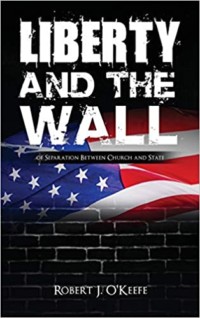Title: Liberty and the Wall: Of Separation Between Church and State
Author: Robert J. O’Keefe
Publisher: PageTurner Press and Media LLC
ISBN: 978-1-64908-697-6
Pages: 177
Genre: Nonfiction / Politics / History
Reviewed by: CC Thomas
Pacific Book Review
In Liberty and the Wall: Of Separation Between Church and State, author Robert J. O’Keefe tackles the controversial Constitutional topic that often pits left against right and religious against non-religious. While many people might think they have a good understanding of the topic, delving into O’Keefe’s book will have readers realizing there is more to be learned and contemplated…much, much more.
O’Keefe’s premises rest soundly on solid evidentiary research which cannot be denied. The author’s conclusions, however, will make even the soundest defenders of the separation of church and state question their own thoughts on the subject. O’Keefe mainly rests his theories on the original documentary evidence, the good old Declaration of Independence. The author claims, rightly so, that the founders of the United States repeatedly stressed that the virtues associated with religion were necessary for governing a democratic society. The book doesn’t argue this point. What it argues is the reason why this view is justified and even necessary for the issue of personal liberty.
To support his ideas, O’Keefe provides historical background for readers, explaining that one purpose in creating the Constitution was as a means to protect and enforce liberties for all (well, for most). The author traces the delicate balance of power to the very beginnings of English government in 1215, cementing that it’s not an easy boundary to establish. Even the Constitution itself, the very document that most use to separate religion (church) from secular institutions (state), makes several references to higher authorities than mere men. O’Keefe traces the conundrum throughout U.S. history, touching on the Lincoln-Douglas debates, as well as the Federalist-Anti Federalist viewpoints. The debates, for example, were largely about one side proving that liberty was a divine right, due to the wording of the Constitution.
Some readers of this review might already have their mind made up about the issue. However, O’Keefe is extremely persuasive. To begin his claims, O’Keefe reminds readers that everyone probably has a different connotation of the word “liberty.” While its basic definition is “freedom,” how this idea connects to a democratized and governed society is debatable. Does liberty come about because of this governance, or is liberty, rather, constrained by it? And, O’Keefe argues, if such grand ideas like religion can’t be imposed on the overall populace, then why does every state in the union mandate certain grand ideas in curriculum? O’Keefe’s take is that education that fails to inform about the basic connection between nature and humanity has failed in its purpose.
In Liberty and the Wall: Of Separation Between Church and State, author Robert J. O’Keefe provides excellent background and analysis of chief governmental guiding policies, arguing that the separation of church from state has never been set in stone and should be a continued topic for debate. He also clarifies common Constitutional misunderstandings. (For example, the Bill of Rights doesn’t actually grant any rights; it simply stops the government from interfering with these rights.) Above all, the author reminds us that our democracy is an experiment and, as such, should always be flexible to the needs of its people whom it serves…and not the other way around.


